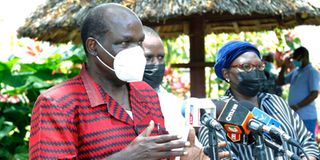BBI: IEBC legal officer says not involved in Supreme Court appeal

IEBC Chairman Wafula Chebukati speaks during an induction of new commissioners in Mombasa on September 10, 2021. The commission's legal affairs director says he was not consulted when Mr Chebukati and two other commissioners decided to appeal the BBI ruling at the Supreme Court.
The opinion of the legal department at the Independent Electoral and Boundaries Commission (IEBC) was not sought before the polls agency appealed the Court of Appeal judgment on the Building Bridges Initiative (BBI).
Mr Michael Goa, the legal affairs director at the IEBC, told the Public Accounts Committee that the decision to file a notice to challenge the appellate court’s decision at the Supreme Court was made by IEBC Chairman Wafula Chebukati and two commissioners.
The Court of Appeal in its August 20 decision, upheld the permanent injunction on IEBC against conducting a referendum in the country for lack of quorum.
At the time of filing the notice at the Supreme Court, the country’s apex court, the commission had only three commissioners — Mr Chebukati, Mr Boya Molu and Mr Abdi Guliye.
Mr Goa, who has been at the commission for one-and-half years, told PAC that moving to the Supreme Court may not have been the best idea after all.
Opinion not sought
“My opinion was not sought. In my view, I would have looked at another way of resolving the issue. But it was the decision of the commission to appeal against the Court of Appeal judgment,” Mr Goa, who made the comments with a lot of difficulty and prodding from the committee, said.
Mr Goa had accompanied the IEBC acting Chief Executive Officer Marjan Hussein Marjan to the committee that is considering the audited accounts of the IEBC for the 2018/19 financial year.
This came as Garissa Township MP Aden Duale, a member of the committee, wondered why the commission chose external advice as opposed to its internal technical team hired and paid for by the taxpayers’ money.
“What is coming out is that the commission went to outsiders to seek an opinion. It can do better by getting opinions from its internal legal team,” Mr Duale said.
In its judgment, which largely upheld the High Court finding, the seven-judge-bench of the Court of Appeal was unanimous that IEBC did not have the quorum to transact business at the plenary, which includes processing the BBI Bill.
Only three commissioners
At the time of processing the BBI Bill, the seven-member IEBC had only the three commissioners after four others resigned in a huff.
Only last week, four new commissioners were appointed and sworn in to fill the void left by the four commissioners.
Dr Roselyne Akombe resigned just days to the October 26, 2017 repeat presidential election after the August 8, 2017 poll was nullified by the Supreme Court.
Three other commissioners — Ms Consolata Nkatha, Ms Margaret Mwachanya and Paul Kurgat — also resigned in April 2018.
They explained that their continued service at the commission was untenable, citing strained working relationships with Mr Chebukati.
The courts said that it was illegal for the commission to continue making far reaching decisions at the plenary without quorum.
While the constitution provides that constitutional commissions, including IEBC, shall have membership of between three to nine commissioners, the IEBC Act places the quorum at five commissioners.
The court findings may, therefore, affect the commission’s past decisions, among them several by-elections.
While throwing out the BBI Bill, the courts were in agreement that there needed to be a legal framework to process constitutional amendment Bills of BBI nature.





